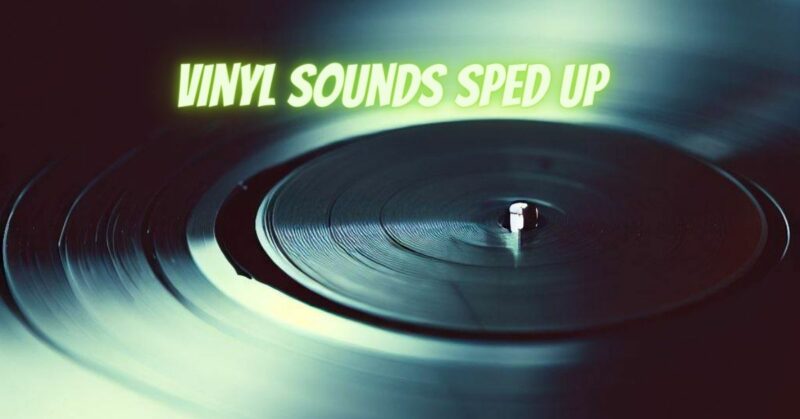Vinyl records hold a special place in the hearts of music enthusiasts, offering an unparalleled audio experience characterized by warmth and authenticity. However, encountering the issue of vinyl sounding sped up can be both perplexing and frustrating. In this article, we explore the potential reasons behind this phenomenon and provide practical solutions to bring the playback back to its original, harmonious pace.
The Magic of Vinyl: Why We Love the Analog Sound
In an age dominated by digital streaming, vinyl records have experienced a remarkable resurgence, drawing both seasoned audiophiles and younger music enthusiasts to the charm of analog sound. The distinct warm tone, rich dynamics, and tangible connection to the music have made vinyl an irresistible medium for many.
Understanding the “Sped Up” Phenomenon
Discovering that your vinyl records sound sped up can be a perplexing experience. Several factors could contribute to this issue:
- Turntable Speed Settings: Vinyl records are designed to be played at specific speeds, typically 33⅓ RPM (revolutions per minute) for full-length albums and 45 RPM for singles. If the turntable’s speed settings are incorrect, it can lead to the perception of accelerated playback.
- Incorrect Pitch Adjustment: Many turntables have a pitch control feature, allowing users to adjust the rotation speed slightly. If the pitch adjustment is not set correctly, it can affect the pitch and tempo of the music, making it sound faster than intended.
- Belt-Drive Turntables: Belt-driven turntables use a belt to connect the motor to the platter. If the belt is worn, stretched, or not installed correctly, it can lead to an inconsistent rotation speed and cause the music to sound sped up.
- Motor Issues: For direct-drive turntables, motor problems, such as motor wear or calibration errors, can cause irregular rotation speeds, resulting in accelerated playback.
Addressing the “Sped Up” Sound Issue
To troubleshoot and resolve the issue of vinyl records sounding sped up, consider the following steps:
- Verify Turntable Speed Settings: Ensure that your turntable is set to the correct speed for the specific vinyl record you are playing. Most full-length albums should be played at 33⅓ RPM, while singles typically require 45 RPM. Some older records may require 78 RPM, so it’s essential to check the record label for the correct speed.
- Check Pitch Adjustment: If your turntable has a pitch control feature, make sure it is set to its neutral position (usually marked as “0”). Adjusting the pitch control to alter the speed intentionally is not recommended unless you are experienced and familiar with DJ techniques.
- Belt-Drive Turntables: If your turntable is belt-driven, inspect the belt for signs of wear, damage, or improper installation. Replace the belt if necessary, ensuring you use a compatible replacement recommended by the turntable’s manufacturer.
- Motor Calibration: For direct-drive turntables, consult the user manual or the manufacturer’s support resources for instructions on motor calibration. Follow the recommended steps to ensure precise motor speed.
- Professional Inspection: If the issue persists, consider seeking assistance from a qualified turntable technician or contacting the manufacturer’s customer support. They can conduct a thorough inspection of the turntable, diagnose any underlying issues, and perform necessary repairs or adjustments.
Vinyl records have a unique way of evoking emotions and connecting listeners to the music in a profound manner. Encountering the issue of vinyl sounding sped up can be disheartening, but by understanding the potential causes and following the troubleshooting steps mentioned in this article, you can restore the harmonious playback to your vinyl listening experience. Remember that regular maintenance and proper care will ensure your turntable continues to deliver the authentic, nostalgic sound that makes vinyl records so beloved, allowing you to savor your favorite albums with the warmth and magic that only analog sound can provide.


